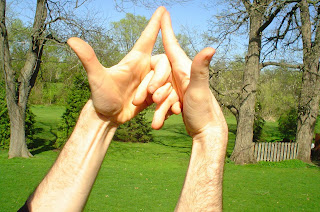 I want to continue a series a started a couple of weeks ago about the early church and the way that they handled discipleship and shepherding of 3000 new believers following Pentecost.
I want to continue a series a started a couple of weeks ago about the early church and the way that they handled discipleship and shepherding of 3000 new believers following Pentecost.Last post, I mentioned that they shepherded by the word--the apostles teaching. Acts 2:42 says next that they shepherded in, or continued in, fellowship. The word is koinonia, which means "close relationship or participation", in this case, in the lives of others.
But more than the meaning, I would like to think about the reality of what it looked like then, our shortcomings as the church now, and what it could look like (I am a dreamer you know, an idealist). So let's think about it a minute.
We are given a little more information in Acts 2:46–47, "continuing daily with one accord in the temple, and breaking bread from house to house, they ate their food with gladness and simplicity of heart, praising God and having favor with all the people. And the Lord added to the church daily those who were being saved." So this fellowship consisted of meeting at the temple for a gathering and going house to house and eating together. The Jewish culture referred to this as the table bond. It meant a special connection was shared with those who came to your home. A friend told his parents recently after they visited a church that didn't seem very friendly on the first visit, he wasn't concerned that they weren't friendly to him, because he could see that they were very friendly and connected to each other (function). This text speaks of the gladness and unity of their time together. This friend knew that such fellowship awaited for those who became a part of it. And of course the hope is that this obvious love that they share for one another bleeds over into their lives daily.
Houses were small for most people in the early church, if they had individual houses. So a gathering of the church would have consisted of no more than about 40 people, probably less. If someone had a really, really big house, maybe 70. But most assemblies were probably smaller than that. No actual buildings that housed the church were found until before the 240's AD. So for 200 years intertwining relationships was natural in very small groups meeting daily or nearly so. So they knew each other well.
Size isn't the only thing that matters, even thought the modern Western world measures success by the size of a church. Closeness, intimacy, and honesty were key in those early days to the function of the church, which is where success is determined. Is the church functioning as a church? That is the question. Is the church being the church? Is it taking care of its members? One of the first issues raised in the early church was Acts 6:1, where widows were not being cared for adequately. So the leadership decided on a plan and the church selected seven men to oversee the serving of 100's of widows. Why only seven? The church was being the church. It didn't need fifteen or twenty deacons to serve 400 women every day or so. And they obviously didn't do it themselves. The church was being the church.
The culture in which we live has promoted a lifestyle of busyness and individuality. The church has gone along with it. The church has forgotten that people are the church (teach your kids, "Here's the building, here's the steeple, open the doors, and there's the church"). We have outsourced the shepherding that we are supposed to do through daily, intimate fellowship to a pastor or a staff of trained individuals. Pay someone to do what you should do, easy right? Meeting three times a week for one hour and having superficial relationships is not enough to function as a church. It will not shepherd people. Thus the church leaves behind a stream of broken people because their closeness was not shepherding; and people without shepherding from the whole body get off track from the mission. A church that doesn't function, doesn't complete the mission. They had a simplicity of heart that was unity focused on the Kingdom. And it all led to worship and people coming to know Christ.
I'm not saying I have all the answers, or am doing what should be done. But think about it, do we shoot ourselves in the foot by the structure that we put in place to make disciples, when koinonia is one of the key pieces to the church and its mission? Do we have people in our lives, are we in theirs, that are deeply rooted in you and you in them, taking care of each other in Christ? I think people are desiring more than a Facebook, email, or a blog (ha ha) to help them through their lives with Christ. They need the community of believers, they need you. Christ bought himself a people, a church, not an individual. Let the be the church, and great things will happen!

No comments:
Post a Comment